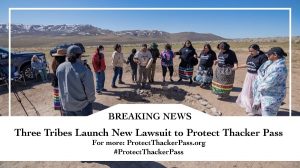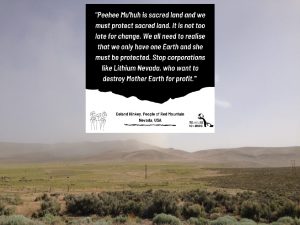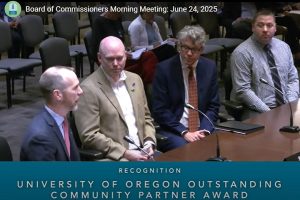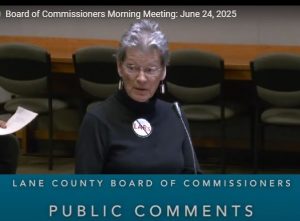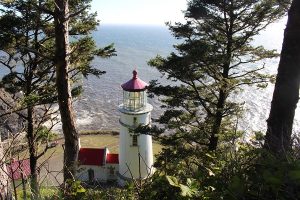Native American groups seek to preserve traditional sites threatened by lithium mine
7 min read
Strip mining of lithium for EV batteries will destroy traditional and sacred Native American sites.
RENO, Nev. — In yet another blow to Lithium Americas’ troubled Thacker Pass lithium mine, the Reno-Sparks Indian Colony and a group of Paiute and Shoshone people from the Fort McDermitt and Duck Valley reservations calling themselves Atsa koodakuh wyh Nuwu (People of Red Mountain) filed a motion in Federal District Court on Tuesday, July 20 alleging that the Bureau of Land Management (BLM) violated the National Historic Preservation Act (NHPA) in permitting the project. The Paiute name for Thacker Pass is Pee hee mu’huh.
The motion alleges that BLM violated at least five provisions of the National Historic Preservation Act section 106 by failing to adequately consult with tribes, failing to give opportunities for public comment, and failing to consider input in development of their plan for mitigating or avoiding impacts to Northern Paiute and Western Shoshone cultural sites in Pee hee mu’huh. The motion asks the court for a “preliminary injunction” which would halt the mining company from conducting any ground-disturbing activities in the near future.
Arlan Melendez, Chairman of the Reno-Sparks Indian Colony, said: “We will do everything possible to support the indigenous People of Red Mountain and protect this sacred place by making sure that the proper consultation is afforded to all stakeholders, especially the Tribes.”
Thank you for supporting
local civic journalism
The motion is likely to result in Reno-Sparks Indian Colony and Atsa koodakuh wyh Nuwu becoming plaintiff-interveners in an existing lawsuit, which was filed on Feb. 26 by four environmental organizations (Basin and Range Watch, Great Basin Resource Watch, Wildlands Defense, and Western Watersheds Project).
The existing lawsuit claims that the Bureau of Land Management violated the National Environmental Policy Act and other laws. Native American claims under the National Historic Preservation Act represent an allegation of wrongdoing not yet heard in the courts, opening a new front in the legal battle.
Will Falk, one of the attorneys representing Reno-Sparks Indian Colony and Atsa koodakuh wyh Nuwu in this case, believes that this motion will likely delay the project significantly and could even void the already-granted Federal permit unless actions are taken to come into compliance with the law.
“The BLM Winnemucca office failed to honor its obligations to consult with Native American Tribes about traditional cultural properties and sacred sites in Pee hee mu’huh under the National Historic Preservation Act. The Joe Biden administration and first-ever Native Secretary of the Interior Deb Haaland have promised that federal agencies will engage in meaningful and robust government-to-government consultation with the Tribes. They are not currently honoring that promise to Tribes who consider Pee hee mu’huh sacred.”
Lithium Nevada, the U.S. subsidiary of Lithium Americas, originally planned to begin constructing the Thacker Pass mine in early 2021 through a contractor with the North American Coal Corporation, but delays in permitting, determined opposition, and concerns from locals have already put the project a year behind schedule.
The Thacker Pass project already faces two lawsuits, official protests to required water rights transfers, a protest camp on the mine site that has been in place for six months, contentious public meetings, and widespread opposition from local indigenous peoples, farmers, and ranchers.
Native opposition has been particularly determined. On June 24, the National Congress of American Indians (NCAI), the oldest and largest national organization of American Indian and Alaska Native tribal governments, passed resolution #AK-21-027 stating that “NCAI opposes the Thacker Pass lithium mine” and calling on the Department of the Interior to rescind the permits.
The injunction request filed today is the second the court has received in the past two months. On May 27, the four environmental groups who filed suit in February also asked the court for a preliminary injunction to halt planned “mechanical trenching” operations at Thacker Pass at twenty-seven undisclosed sites. This trenching would be up to “40 meters” long and “a few meters deep” at seven sites. The remaining twenty sites would undergo excavations up to five feet deep.
In response to the news of this planned trenching, Atsa koodakuh wyh Nuwu organized a rally on July 7 at the offices of Far Western Anthropological Research Group, Inc., the for-profit archeological company hired to excavate the cultural sites at Thacker Pass. At the demonstration, speakers from allied groups and Atsa koodakuh wyh Nuwu emphasized that the proposed mining activities will desecrate this sacred place, which is the site of a massacre described in Paiute oral history.
In an official statement delivered to Far Western employees, the group stated: “The Tribal Members who comprise Atsa Koodakuh wyh Nuwu are fiercely concerned with the proposed desecration of cultural sites and ancestors’ remains. Our oral histories are clear regarding the fact that Peehee Mu’huh [the Paiute name for Thacker Pass] is a massacre site. Western science, government policy, and corporations deny our self-determination and self-representation through this failure to honor traditional knowledge; proposing to verify our truths through an act of desecration instead.”
Supporters of Atsa koodakuh wyh Nuwu have also filed complaints with the Register of Professional Archeologists alleging the digging up the cultural and burial sites at Thacker Pass. Removing cultural artifacts and remains without full consultation and consent violates the ethical principles outlined by the Society for American Archaeology. Principle Number 2: Accountability states that “responsible archaeological research, including all levels of professional activity, requires an acknowledgment of public accountability and a commitment to make every reasonable effort, in good faith, to consult actively with affected group(s), with the goal of establishing a working relationship that can be beneficial to all parties involved.”
The People of Red Mountain’s letter confronts Far Western’s breach of ethics and emphasizes the responsibility of Far Western’s archaeologists “to heal historic traumas and re-vision the relationship between Archaeology and Indigenous Peoples to be based on morality and ethics rather than extraction of ancestors, minerals, and knowledge.”
Lithium Americas stock price peaked at $26.82 on Jan. 19, four days after the Record of Decision was released, but has since dropped to half that value. The mine project, which would violate indigenous rights, destroy important wildlife habitat, and pollute air and water, has been described as a “national and international embarrassment.”
Timeline
- Jan. 15, 2021 — Due to regulations cuts and “fast-tracked” permitting under the Trump Administration, the Bureau of Land Management releases a Record of Decision approving the Thacker Pass mine less than a year after beginning the Environmental Impact Statement process required under the National Environmental Policy Act. On the same day, the Protect Thacker Pass camp is established.
- Feb. 11, 2021 — Local rancher Edward Bartell files a lawsuit (Case No. 3:21-cv-00080-MMD-CLB) in U.S. District Court alleging the proposed mine violates the Endangered Species Act by harming Lahontan Cutthroat Trout, and would cause irreparable harm to springs, wet meadows, and water tables.
- Feb. 26, 2021 — Four environmental organizations (Basin and Range Watch, Great Basin Resource Watch, WildLands Defense, and Western Watersheds Project) file another lawsuit (Case No. 3:21-cv-00103-MMD-CLB) in U.S. District Court, alleging that BLM violated the National Environmental Policy Act, Federal Land Policy Management Act, and other laws in permitting the Thacker Pass mine.
- May 13, 2021 — Lithium Nevada informs Plaintiffs in the Feb. 26 lawsuit that it intends to begin ground disturbance at Thacker Pass as soon as June 23 to remove Native American artifacts and cultural sites as part of a “Historic Properties Treatment Plan.”
- May 20, 2021 — Atsa koodakuh wyh Nuwu releases public statement of opposition to the Thacker Pass mine & starts a petition which has gathered nearly 2,000 signatures.
- May 27, 2021 — The four environmental groups who filed suit on Feb. 26 ask Federal Judges for a Preliminary Injunction to block Lithium Nevada’s proposed Historic Properties Treatment Plan.
- June 8, 2021 — In exchange for a two-week extension to file response briefs to the Plaintiffs’ Motion for Preliminary Injunction, the BLM and Lithium Nevada agree that no ground disturbance activities at Thacker Pass would occur before July 29, 2021.
- June 12, 2021 — A rally opposing the Thacker Pass mine is held in Reno, Nevada, with several hundred people attending. Speakers include members of the Pyramid Lake Paiute Tribe, Fort McDermitt Paiute-Shoshone Tribe, Duck Valley.
- June 24, 2021 — The National Congress of American Indians (NCAI), the oldest and largest national organization of American Indian and Alaska Native tribal governments, called on the Department of the Interior to rescind the permits for the Thacker Pass project.
- July 7, 2021 — A rally is held at the Carson City office of Far Western Anthropological Research Group, Inc., the for-profit archeological company hired to excavate the cultural sites at Thacker Pass. Atsa koodakuh wyh Nuwu (People of Red Mountain) deliver a signed letter stating that if Far Western digs up sacred and cultural sites at Thacker Pass, they will be committing actions that are unethical and wrong.
- July 19, 2021 — The Reno-Sparks Indian Colony and Atsa koodakuh wyh Nuwu (People of Red Mountain) file a motion in Federal District Court alleging that the Bureau of Land Management (BLM) violated the National Historic Preservation Act (NHPA) in permitting the planned lithium mine.
ATTACHMENTS:
- Motion filed in U.S. District Court on July 19 by the Reno-Sparks Indian Colony and Atsa koodakuh wyh Nuwu (People of Red Mountain).
- Letter to Far Western Anthropological Research Group from Atsa koodakuh wyh Nuwu (People of Red Mountain).
